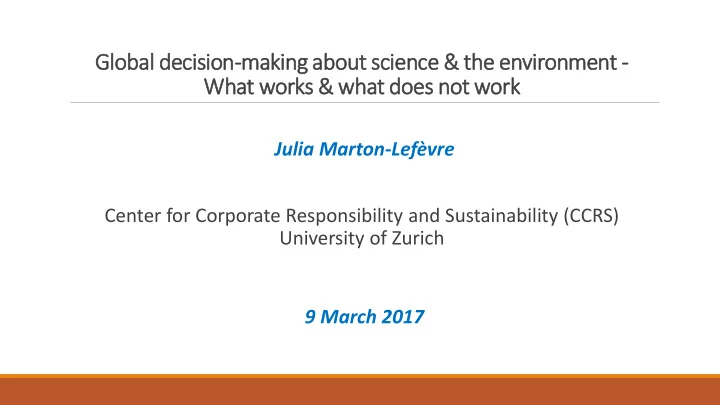

Global decision-making about science & & the environment - What works & & what does not work Julia Marton-Lefèvre Center for Corporate Responsibility and Sustainability (CCRS) University of Zurich 9 March 2017
From academic papers to action “It is no longer enough to simply do the science and publish an academic paper. That is a necessary first step, but it moves only halfway toward the goal of guiding the planet toward a future that is sustainable for both human civilization and the biosphere”. Elementa, the Science of the Anthropocene: A voiding collapse: Grand challenges , March 2016
Lisbon, 09:40, 1 November 1755
Voltaire, 1694-1778 “We must cultivate our own garden”
• • SUSTAINABLE DEVELOPMENT GOALS (S
Transforming Our World by 2030: A new Agenda for Global Action A plan of action for people, planet and prosperity : People : end poverty and hunger; Planet : protect the planet from degradation Prosperity : all human beings can enjoy prosperous & fulfilling lives Peace : peaceful, just and inclusive societies Partnership : revitalised Global Partnership for Sustainable Development
COP 21: Paris 30 November- 11 December 2015 Recognizes that climate change represents an urgent & potentially irreversible threat to human societies & the planet, requiring the widest possible cooperation to accelerate the reduction of GHG emissions.
Paris Agreement Implementati on on December 2015: The Paris Agreement on climate change adopted in 2015 marking a critical turning point toward a zero-carbon and resilient world. April 2016: 180 Parties signed the Agreement. Signing indicates a commitment by a country to refrain from acts that would defeat the object and purpose of the Agreement. The Paris Agreement entered into force on 4 November 2016, “when at least 55 Parties to the Convention, accounting in total for at least an estimated 55 % of the total global greenhouse gas emissions have joined by depositing their instruments of ratification, acceptance, approval, or accession .”
UN organizations: collaboration or competition ?
Rio Conventions
MEAs Seeking Synergies
1992 Earth Summit Three non-binding instruments: • Rio Declaration: 27 Principles • Forest Declaration • Agenda 21
Major Groups & Other Stakeholders (MGOS) Women (but not men?) Children and youth (but not older citizens?) Indigenous peoples Farmers (but not fishermen?) Business & industry Workers & trade unions Scientific & technological community Local authorities Non-governmental organizations (all not in the other 8? Universities? Faith-based groups?)
A Sea of acronyms to change the world? IUCN MAVA IPBES GEF STAP CMS CITES SSC CEM UNEP SCOPE ICSU IGBP CCICED WCRP TNC IPCC WWF CI SE4All TEEB CCAMLR SEI Ramsar UNCCD GLISPA UNFCCC IIED ISSD SDGs MDGs CGIAR CBD WEF GEO4 NBSAPs MEAs IRENA WAZA GFN…………………………..
Science and policy interface
78,000 species assessed; More than 22,000 threatened with extinction
Natural Capital The world’s stock of natural assets, including the air we breathe, the water we drink and all living things. A way of defining the wide range of benefits or services that we derive from nature. Natural Capital is essential to life and it underpins thriving societies and prosperous economies.
Valuing Natural Capital Combining economic benefits with quality of life benefits: Forests deliver 130 b $ / year to 1.6 b of w orld’s poorest people Degraded land restoration: 150 m ha by 2020 = 84b $ /year livelihoods benefits and 1 Gt of CO2 sequestered Healthy coral reefs: 172b $ / year tourism, coastal protection \
SDG Compass: GRI, WBCSD & UN Global Compact A new partnership making the case for business. As the SDGs form the global agenda for the development of our societies, they will allow leading companies to demonstrate how their business helps to advance sustainable development, both by minimizing negative impacts and maximizing positive impacts on people and the planet.
SDGs to generate new business value
Unilever
Questioning GDP Ban Ki-moon: "We need to move beyond gross domestic product as our main measure of progress, and fashion a sustainable development index that puts people first" Joseph Stiglitz: “Our preoccupation with GDP makes it difficult for politicians to back policies that are good for society and for the environment but which might not result in an increase in GDP .” Amartya Sen : “Many things of value in life cannot be captured by GDP, but they can be measured by metrics of health, education, and freedom .” Ashok Khosla: "If we are to end gross disparity & poverty, reduce rampant climate change & species extinction, avoid destruction of resources, we must go well beyond simplistic indicators such as the GDP.”
Growth in a different way? Growth without limits Limits to Growth Growth within limits
What works and What does not Breaking walls between disciplines, Remaining in silos Cooperation / meaningful partnerships Competition / duplication of efforts Sustainability: long-term picture Short-termism Systems thinking Reductionist thinking Negotiations leading to action Negotiations leading to no follow-up Clear communications Technical & lengthy jargon Offering solutions Gloom and doom messages Courage Giving up
Earth Day 1970
Thank you
Recommend
More recommend